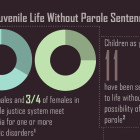
The High Court Should Give Juveniles the Chance to Prove They Have Changed
|
I suppose it was difficult to imagine Louis Perez changing course. He was only 14 years old when I met him in a probation camp, and yet, he seemed entrenched in the deepest, lethal absence of hope. Unable at that young age to transform his pain of abuse, abandonment and torture, he seemed set on a path doomed to transmit his pain forever. Now, almost 20 years later, after considerable prison time and having been stuck in a desperate cycle of gang violence and drugs, Louis runs things for me at Homeboy Industries, the nation's largest gang rehab and re-entry program. It shouldn't surprise us that children and teenagers aren't the same people once they become adults.
